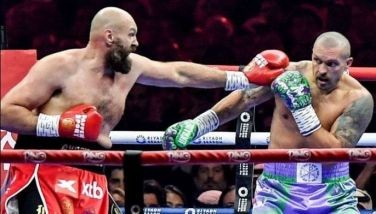Longest win streak in varsity sports

It’s a little-known fact that Trinity College – a school with a student population of 2,300 in Hartford, Connecticut – holds the record for the longest winning streak in varsity team sports. And it’s in the game of squash.
Last February, Trinity came from behind to beat Yale, five games to four, in a nerve-wracking dual meet for the US College Squash Association (CSA) men’s division I championship at the Murr Center on the Harvard University campus. It was the Bantams’ 244th win in a row and 13th straight national title under coach Paul Assaiante who had never heard of squash when he was contracted to pilot the West Point team in 1977. Assaiante got the Army squash job only in a side agreement that went with his major assignment as tennis coach.
In 1996, Assaiante took over as Trinity squash coach and hasn’t looked back since. Overall, his record in match play is 307-14 with the Bantams’ last loss coming in February 1998.
This past season, Trinity hacked out the close win over Yale in what had to be the toughest campaign in the Bantams’ history. Yale was up, 3-2 and 4-3, before Trinity closed it out with consecutive wins from No. 7 Johan Detter of Sweden and No. 4 Chris Binnie of Jamaica. Binnie wrapped up the crown via an 11-9, 11-9, 9-11, 11-7 decision over South Africa’s Ricky Dodd. The fourth set was over early as Binnie raced to an 8-2 lead then cruised to seal it.
In match play, each team racks up nine players, seeded from No. 1 to No. 9. Each player battles his counterpart in a best-of-five game using the point-a-rally system.
Trinity’s 24-man roster included 10 foreign recruits – Binnie, Detter, Antonio Diaz of Mexico, Daniel Echevarria and Andres Vargas of Colombia, Reinhold Hergeth of South Africa, Bikram Malhaltra and Parth Sharma of India, Jose Flores of El Salvador and Randy Lim of Penang, Malaysia. The tallest players in the lineup were 6-5 Detter and 6-3 Binnie. Of the 24 players, 19 stood six feet and below with four players at 5-7.
* * * *
As Trinity’s cast of characters indicates, squash doesn’t require height for a player to excel – it’s a sport where Filipinos could become serious world contenders because they’re quick, graceful, smart and technically proficient. What has stunted squash’s growth in the country is the absence of public courts. You can only play squash in private clubs like the Makati Sports Club, Palms Country Club, Manila Polo Club, Rockwell, Manila Boat Club, Quezon City Sports Club, Asian Development Bank, Punta Fuego and the Alabang Country Club. To address the problem, Squash Rackets Association of the Philippines (SRAP) president Romy Ribano has initiated moves for the construction of two courts at the Rizal Memorial complex with support from the Philippine Sports Commission (PSC). A P7 Million budget has been allocated for the project and if construction can begin next month as planned, the courts may be ready by December. To speed up the process, SRAP vice president Boyong Deles said a private engineering group headed by sportsman Claudio Altura will undertake the design of the courts for approval by the PSC.
In the finals against Yale, the five Trinity players who posted wins were No. 1 Malhaltra, No. 2 Sharma, No. 4 Binnie, No. 6 Diaz and No. 7 Detter. Next season will be even more challenging for Trinity as 13 seniors won’t be back, including five who played in the recent finals. James Zug, writing in Squash Magazine, said Trinity’s last loss – only Assaiante’s 14th as coach – came when Justin Bieber was three years old and the Monica Lewkinsky affair was just breaking. “The 15th loss is coming some day, some year,” he said. “Not yet, not now.”
For the record, the second longest winning streak in college team sports is the Yale men’s swimming team’s 201 victories in 1940-61. Other streaks are 137 wins by the Miami men’s tennis team in 1957-64, 109 wins by Penn State women’s volleyball team in 2007-10, 92 wins by the North Carolina women’s soccer team in 1990-94, 88 wins by the UCLA men’s basketball team in 1971-74 and the University of Oklahoma’s 47 football wins in 1953-57.
In professional sports, squash also takes the limelight for producing the athlete with the longest winning streak – Pakistan’s Jahangir Khan who strung up 555 straight victories in 1981-86.
Trinity’s campus sits on a 100-acre property in downtown Hartford. It boasts a faculty-student ratio of 10:1. The school offers 38 majors in liberal arts and sciences and 26 interdisciplinary minors. The student body comes from 45 US states and 47 different countries. Trinity competes in the New England Small College Athletic Conference and maintains varsity teams in squash, rowing, ice and field hockey, football, cross country, soccer, golf, baseball, tennis, swimming, volleyball, lacrosse and softball. Over 60 US colleges and universities play in squash leagues.
* * * *
Last year, Assaiante – known as the winningest coach in college sports history – authored a book entitled “Run To The Roar – Coaching To Overcome Fear,” chronicling Trinity’s 5-4 win over Princeton in the 2009 CSA national finals. Assaiante, 61, coined the phrase “run to the roar” as a challenge to his players to confront adversity and not run away from stiff opposition.
Assaiante said while the book revolves around squash, it delves more on the abstracts of leadership, pride, instinct, control, anger management, talent and mentoring. Several sports luminaries have come out to praise Assaiante for his book. Duke basketball coach Mike Krzyzewski said, “Winning is difficult ... to win all the time is amazing ... Assaiante shares with us the passion, preparation and execution necessary to be an incredible winner.” Tennis legend Billie Jean King marvelled at Assaiante’s “winning attitude, his commitment to excellence and his formula for creating champions on and off the court.”
“Run To The Roar” is a squash book worth reading because it isn’t only inspiring but also revealing. Squash, a sport that is knocking on the doors of the Olympics, is becoming more and more popular all over the world. It was invented at an English prep school in the 1850s and is now played by more than 250,000 Americans every week. There are over 50,000 squash courts in 188 countries and pro tournaments are staged on portable glass courts in non-traditional venues such as the Grand Central Station in New York City and the Millennium Park in Chicago. Malaysia is the squash hotbed in Asia with the world’s No. 1 female player Nicol David the country’s most celebrated athlete.
- Latest
- Trending































